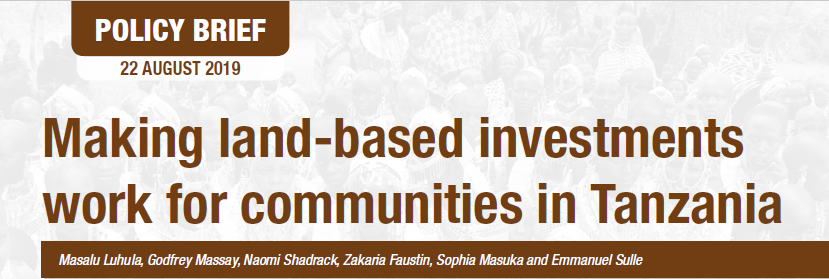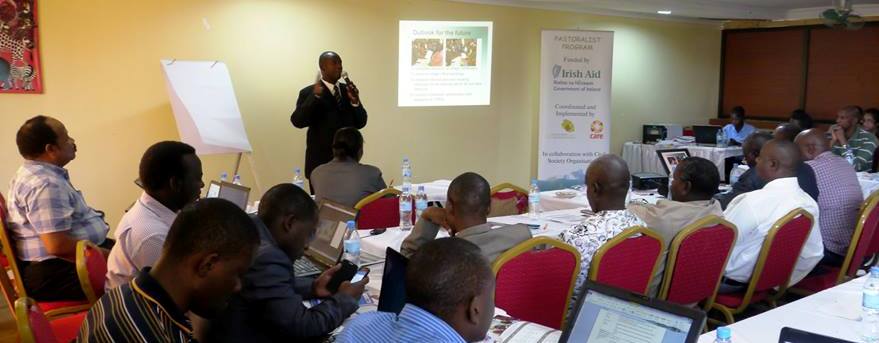Pastoralist Programme Annual Stakeholder meeting
Royal Village Hotel 16th- 17th December 2015
Care and TNRF through Pastoralist Programme organized two days Annual stakeholders meeting on 16-17 December that brought together key actors from government and its agencies, community members, Local government authorities, more than 42 pastoralist Civil Society Organizations(CSOs), Experts and beneficiaries. The meeting officiated by Ms Anucita Njombe on behalf of Permanent Secretary from the Ministry of Agriculture, Animal Husbandry and Livestock, and Fishing Development. In the two days meeting, there were interactive discussions on policies that support and constrain pastoralist livelihood, evidence based facts sharing, sharing of experiences of working and support pastoralists, testimonies and various researches findingsin various thematic areas.
In the meeting therepresentations of research findings from implementing partners done in 2015:
- PINGOs Forum shared the study findings on “The importance of micro and macro socio-economic contribution of pastoralism”,
- CEDESOTA on “Environmental and Socio-economic Benefits of Pastoralism to the Well-being of Pastoralists and Agro pastoralists in Tanzania”
- KINNAPA shared on a study of six districts on “Status of grazing lands in pastoralists’ districts and its impacts on household”; and
- TAPHGO shared Fact sheet-on “the relevancy of mobility in a disequilibrium environment”
The pastoralists program management team that involved Care and TNRF shared with participants the Programme 4 years (2012-2015) Update, and also documentation (short film) on Climate Change and land rights to pastoralists’ women livelihoods. Experts and researchers shared with stakeholders key issues in each sector: Mr. Alais Morindat from IIED/TNRF presented Case Study research findings on “Approaches for supporting pastoralists groups facing climate change effects in Tanzania”. He also leaded another presentation and discussion on “The Current and Future Pastoralism Outlook –local and Global Trends”
Ms Anuciata Njombe shared with participants on how livestock Policy of 2006 address pastoralist issues and challenges in Tanzania; Prof. Prosper Ngowi shared on “Which path to go on Land Conflicts Between Pastoralists and Others Users and Its Impact on Poor Community Livelihoods and National Economic Growth”.
In the end of the meeting, participants worked together to enrich pastoralist Programme exit strategy and sustainability of the programme, most partners recommended to continue strengthening advocacy initiatives to influence development of pastoralism policy, activate national campaign in land use conflict resolution, support development of resources sharing plan through land use planning, and development of apex body that will steer pastoralists actors at national level.
The pastoralist associations used the avenue to outcry to government by issuing a statement to condemn the ongoing killings of pastoralist and livestock. The 42 pastoralist associations acknowledged thecurrently efforts made by the fifth President of United Republic of Tanzania, and Minister responsible for Livestock development during political Campaigns and also during the period in the Office, that all have promising positive future in the improvement of indigenous pastoralist’s livelihoods. In the statement, pastoralist CSOs proposed eight steps to be taken by the government to end up the ongoing land use conflicts and killings including reallocation of grazing land to pastoralist all grazing lands grabbled by investors, initiate and support national campaigns on the land use conflict resolution to influence peace and tranquility, the government to review and harmonize policies to ensure equal sharing and benefits of resources, to review sectorial frame works like Land Acts and Wildlife Act to recognize pastoralism and rights of pastoralists to land, livestock to be recognized as other assets with value and rights to access land, and the government to develop pastoralism policy that give rights to indigenous pastoralist. Others include Tanzania Investment Centre(TIC) to take precaution measures before allocation of any land to investors to recognize the rights of various land users in that area, and lastly the government in collaboration with other actors to review laws and policy to identify areas for improvement to strengthen rights of pastoralists and small holder farmers as well as formation of technical team that will involve all actors and stakeholders that will recommend stepwise processes to follow to eliminate land use conflicts in Tanzania.
The government committed in the meeting to continue support stakeholdersinitiativesto ensures peace and support in addressing pastoralist issues and challenges that constrain pastoralists’ livelihood improvement in the country.


